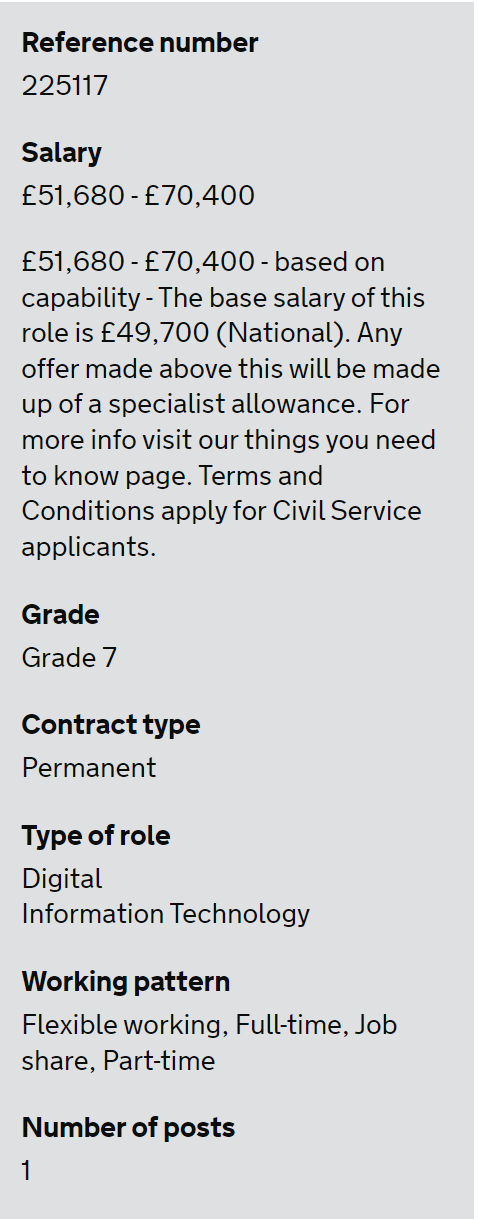The Case for Higher Pay in the Civil Service
The Problem
When I joined the Civil Service one of the things that surprised me the most was the amount of contractors, technically service companies’ employees. My team was particularly bad in that it had around 50% of the engineers being from a service company and this wasn’t the tail end of a big project or programme, this was the status quo and remained the same during my time with the team and by all accounts it was the same when I left the Civil Service two years later.
To be clear, this is not common, not all teams are 50% civil servants only, but there are a huge number of contractors, mostly through service companies, the cost of which is borne ultimately by the tax payer who funds and uses the services provided by the civil service, even if reluctancy, I worked for HMPPS.
These are some of the negative effects of using contractors (not an exhaustive list):
- Higher costs: The service companies have to make profits thus they are going to be more expensive that a civil servant.
- Loss of Knowledge: Service companies tend to rotate employees out of engagements, thus knowledge about the domain goes with them.
- Delays in implementations: This is perhaps a bit more subtle but since the service companies are significantly more expensive, the civil service tries to avoid them until absolutely necessary thus there can be delays.
The point I’m trying to make is that the Civil Service is struggling to fill the vacancies it has open and to retain people, which is driving the cost of services delivery higher and also potentially delaying service delivery as well as potentially compromising quality, which means that the tax payer is getting a worse deal than if the vacancies were to be filled by civil servants.
I would like to stress that the situation is a little different for big projects or programmes of work but I will leave that for another post.
A concluding remark is that, to me, it is very interesting that there are consultancies that specialize in public service, e.g. MadeTech or Methods, as it suggests that they are counting on the status quo continuing and it’s not hard to see why. Any PM that dares to raise civil service pay would be savaged by, the mostly right wing, press, even if it does lead to better outcomes in terms of service delivery, efficiency etc.
But Why
I think the problem for recruitment is three-fold:
- Comparatively low pay.
- Complicated pay policies.
- Perceptions of what working for the civil service is like: Legacy technologies, Outdated and slow processes , byzantine decision making, etc ..).
The problems also apply to retention, by the way, but with actual knowledge of what working for the civil service is like, which can be good or bad, more on this later.
Pay and Pay Policies
Let’s take this vacancy:

This sounds like a bit on the low side for a lead devops engineer until you read this:
The salary range is £53,101 to £59,764. Where the maximum salary is offered a Digital Allowance of up to £15,000 per annum may be available for exceptional candidates based on our assessment of your skills and experience.
This means that your pensionable salary will be capped at £59,764 and that you might get a non-pensionable allowance of up to £15K. This allowance can be removed at any time and does not contribute to your generous civil service pension, so rather than accumulating 2.32% of ~ £75k per year towards your pension, it would only be ~£60k, which over 20 years of service would mean a difference to your pension of ~£7k. That is to say you will receive a yearly pension £7k lower (£27.8k vs £34.8k), which makes this position a lot less attractive.
It’s also worth bearing in mind that salary is likely the top of the band. In practice this means one of two things:
- You get a lump sum equivalent to what your pay rise would’ve been until such time when then pay band increases.
- If the top of the band does increase, then you will get a pay rise to the top of the band, I think.
This is to say nothing of the how complicated the pay policy is or indeed the hybrid policy, but let’s not get into privileged ministers leaving passive-aggressive notes on civil servants’ desks.
How about this vacancy??

This includes an £8000 allowance but it also has this, probably broken once the vacancy disappears
New entrants to the Civil Service will be expected to join at the salary minimum of the grade for which they applied. If an applicant at the offer stage wishes to negotiate higher starting pay, they will be required to submit a case with supporting evidence; UKHO will consider the case against several factors, including our total reward and benefits offering, the difficulty of recruiting the > role, and scarcity of skills. Higher starting pay will only be considered if the salary range (i.e. the minimum and maximum) for the role, and/or a specific recruitment allowance, has been advertised.
This is sadly pretty common and my experience not the case, but when I raised this I was told that it needs to be added to the job adverts.

On the face of it, this one doesn’t look too bad, sure you can get paid more in Industry but then you find this, which might leave you a bit confused as to what is the salary on offer, given that the locations are both National, I suspect that what’s shown is the banding for London.

Those are actually three of the better looking hits when searching for devops in the civil service jobs.
So in an attempt to sum up:
- The pay is low to very low.
- Pay structure is complicated.
Solution
So what are the solutions
Pay
This is relatively simple:
Pay more and simplify the pay structure.
I’ve not really said much about how fiendishly complicated things can get with different bands, grades, specialist pay, DDAT, RRA, mark time and probably a myriad other things I’m just not aware of.
Not Process Heavy … maybe
The truth unfortunately is that there is a lot of variance between departments/ministries and even inside departments, so there is some justification in thinking that you might end up working with legacy technology in a very process heavy way and with byzantine decision making and, as with any cultural change, this is going to be difficult but not impossible evidenced by the fact that a lot teams do use very modern methodologies and are not encumbered by processes or hampered by legacy tech or byzantine decision making.
There are code in the open mandates and a drive to use docs as code among a myriad other cool initiates and projects, so it most certainly isn’t legacy stuff on legacy processes.
Oh, and don’t think that the code in the open is something it’s there but is ignored see the public repos for MOJ or DWP or DEFRA